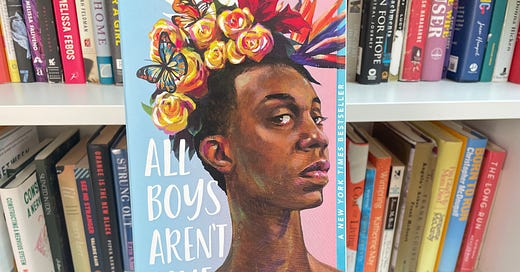All Boys Aren’t Blue: A Memoir-Manifesto, by George M. Johnson
This YA memoir is the second-most banned book in the U.S.
Memoirs with Melissa shares twice monthly reviews intended to expose readers to diverse authors and life experiences. I welcome and value every free subscriber. Paid subscriptions are an extra way to support my work in elevating the canon of human experience. Thank you!
In keeping with my intention to slow down and read deeply, and in honor of its paperback release last week, I reread All Boys Aren’t Blue: A Memoir-Manifesto, by George M. Johnson.
I can vividly remember where I was and what I was doing during my first listen to this bold collection of purpose-filled essays. Three years later, the manifesto has claimed the spot of second-most banned book in the United States.
If you’re wondering what Johnson’s reasoning was for writing a book that turned out to be so controversial, you don’t have to guess. They tell us. This is the coming-of-age collection of stories they and so many others needed as queer Black people being raised in a heteronormative, whitewashed world.
If you’re wondering what Johnson’s reasoning was for writing a book that turned out to be so controversial, you don’t have to guess. They tell us.
While each essay is focused and direct in its message, none are so on-the-nose as to not be beautiful. My literary taste has evolved over the past few years, and Johnson gave me much to feast on. For example, by the title “All Boys Aren’t Blue” they’re referring to more than a color traditionally used to represent “boy.” (For more on that, see the afterward and the new author reflection at the front of the paperback version.)
But first, check out “Identity,” where Johnson tells the highly relatable story of learning as a kid that they had a legal first name they didn’t know existed. Upon discovering they’d been going by their middle name since birth, they decided to go by their first name, a novelty and enviable switch in a classroom full of eight-year-olds. As the purpose of the chapter begins to dawn on the reader, Johnson makes the symbolism clear for their younger target audience: “…respect people for their names, and for how they choose to identify. This also goes for respecting people and their choice of pronouns—he/him, she/her, they/them, god, goddess, or whatever.”
…the cowboy boots story is possibly the most endearing of the entire book, one that makes clear why the whole of it revolves around their grandmother Nanny and the one essay that doesn’t seem to fit at first glance.
The writer in me couldn’t get enough of “Fags Play Football, Too,” an essay that uses Johnson’s Double Dutch days to illustrate the challenge of navigating binaries like male/female and gay/straight. And the cowboy boots story is possibly the most endearing of the entire book, one that makes clear why the whole of it revolves around their grandmother Nanny and the one essay that doesn’t seem to fit at first glance.
While this book was designed for the young adult reader, it’s also relevant and necessary for a wider adult audience. Many of us are quite adolescent in our understanding of queerness, gender identity, and the unwhitewashed version of history. Even as a white, cisgender woman, I can attest to this book and so many others by queer authors being instrumental in my own questioning process.
Even as a white, cisgender woman, I can attest to this book and so many others by queer authors being instrumental in my own questioning process.
This memoir does contain difficult topics and words, which Johnson makes no attempt to conceal. Each scene and term is carefully chosen. They tell the reader upfront to expect material on sexual assault, loss of virginity, homophobia, and racism. As a parent, I suspect my middle-grade reader kids won’t yet voluntarily venture into some of the more difficult chapters like “Boys Will Be Boys…” on Johnson’s experience with childhood sexual assault and “Losing My Virginity Twice” on their forays into consensual sexual activity with partners. Even so, this book now lives in our Florida home on our freely accessible banned books shelf for whenever my kids feel the need to explore or I feel led to share.
As Johnson says themself, these things happened to them when they were a child, teen, and young adult, and they’re happening and have happened to kids and young adults today without anybody else knowing about it. All Boys Aren’t Blue gives kids, as well as their parents and siblings, a safe and enlightening way to access life-saving information. This is a fun, fast, high quality read on tough, critical topics.




